| |
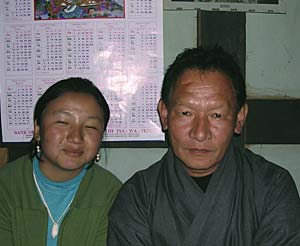
Pema Tsering and his cousin, Deki Wangmo. (Photo: Karen Michel)

PEMA: I was born here in this house. This is four story….(fades under)
MICHEL: Pema Tsering was my guide to Bhutan. A businessman in his mid-forties, he’d been recommended by friends. Pema wasn’t really a guide, but he seemed to know everyone, and at least something about everything. I was told often that he was considered the Bhutanese Patrick Swayze: he’s a good dancer and, in profile, you could see the resemblance in the sculptured cheekbones and the set of the jaw. But this Patrick Swayze wears a dark robe-like garment, the go, traditionally worn by Bhutanese men. Now, Pema lives in the city, though he clearly remembers the home of his childhood, in the village of Nimju.
PEMA: …dry our meats and everything and then hardly any vehicles, only a couple of trucks and few jeeps. So, for us, like when we used to see vehicle coming from far away we used get so scared as if a monster’s coming to us and we used to jump off the road, look for a bush, hide behind a bush. And that was how it was. Now, after all these years when I’m back it has developed like hell.
MICHEL: The roads don’t yet reach all of the country, nor does electricity, though it’s come to Nimju.
PEMA: Everybody has light. In fact, you can see in the kitchen, also now with gas, gas stove. Then electrical equipments like the water boiler, rice cooker, and everything you see. Those, just, didn’t even know what these things were for.
MICHEL: And then, as we were talking, the lights went out.
MICHEL (TO PEMA): And what just happened?
PEMA: Electricity failure. But you can see some lights on the other side, so must be this phase must have gone.
MICHEL: No big deal to Pema, as we went back to using the kerosene lamps of his youth. The electricity, delivered mainly by hydropower, is somewhat erratic, both in the city and here, in the village. Pema’s teenaged cousin, Deki Wangmo, lives in this house when she’s on break from school in the city of Thimpu. We stand at the entrance to the Chosum, the prayer room that’s in every Bhutanese home. There are paintings of the Buddha in various forms, draped with white prayer shawls, brass bowls of water, some oranges, sticks of incense. A calico cat drinks water from the offerings. Deki says that’s good luck. She wears the traditional women’s dress, the kira. The garment is in earth toned stripes, and reaches to her ankles. Deki wears a white blouse underneath and a fuschia colored jacket over it.
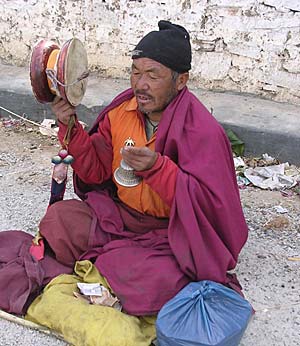
A monk at the Paro market. (Photo: Karen Michel)
|
DEKI: Everything is changing especially those staying in the town they always wear pants and all, and those who are wearing gos and kiras , they are also encouraged to wear pants.
MICHEL: Teenagers everywhere like to be trendy, even in the Buddhist kingdom of Bhutan. Deki thinks the desire to dress like the west is a potential threat to life as her elder cousin Pema knew it.
DEKI: I’m not really sure but 50 percent, I think, of Bhutan is definitely going to lose culture. If we lose our culture, then I don’t think they will give much importance to our culture no. Then after that, all will be like foreigners only, all the Bhutanese peoples. Then after that, I think somebody might come and rule our country.
MICHEL: She means China or India, just as India took over Sikkim and China absorbed Tibet. She hopes the king will be strong in resisting their overtures.
DEKI: OK, I’ll sing one song. It’s in praise of our king. In those olden days….
[DEKI SINGS]
[MONK CHANTING]
MICHEL: In the outdoor market in Paro, vendors sell produce, haunches of dried yak meat, large posters of the king, home made chili powder, and rubber flip flops. Everyone wears either a kira or a go, except for the many monks in their maroon robes. A monk sits at the entrance to the market, chanting. Everyone who passes gives him at least some change. Generosity is expected. It’s part of the Buddhist way.
[MONK CHANTING]
KHANDU: My office is not only an office, it’s a small temple. I’m surrounded with all the deities. I draw spiritual inspiration from them.
MICHEL: Rinchen Khandu lives in the city of Thimpu, a couple of hours moderately terrifying drive from Paro. Rinchen Khandu’s business card reads, "rich and can do." It’s likely the latter part is more accurate. Rinchen composes music for the fledgling Bhutanese film industry, works on a Dzonka-English dictionary, and is father to a five-year-old allegedly reincarnated lama, a Tikku.
| |
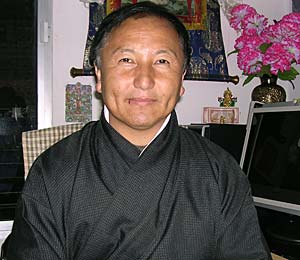
Rinchen Khandu (Photo: Karen Michel)
KHANDU: Buddhism in our language is called Namba. Namba means self-introspection. You have to look inside yourself and to look inside yourself you have to have the third eye of course. The two eyes are always looking outward, we have to employ the third eye within ourself and see what is best and then glean the best and use it try to adjust to our own situation. That’s what we are trying to do. And that’s also the policy of the royal government of Bhutan.
KING’S ANNOUNCEMENT: (in Dzongka) (Fades under)
MICHEL: On July 2nd, 1999 in a speech as part of his silver jubilee celebration, the king made a surprise announcement. It came near the end of his remarks, and received the only applause of the event.
(KING’S ANNOUNCEMENT): …television, internet…." (then fades under)
MICHEL: The king said that from that moment on, television and the internet would be allowed in the country of 700,000 or so people, most of them rural, most of them farmers, many of them without the electricity necessary to use these innovations. Some Bhutanese already had illegal satellite dishes to receive TV from India, hidden under the eaves of the roof of their homes. As I learned from one of Pema Tsering’s friends at Benny’s bar in Thimpu, the king’s announcement was welcome, but not seen as a big, big deal by most Bhutanese.
MAN: We had video movies before TV. So when TV came in it wasn’t like ‘wow’ or you know, ‘great’ or ‘we’ve never seen a TV.’
DORJI: …This is the History channel…
MICHEL: Rinzy Dorji was ecstatic about the king’s announcement. Now. he’s one of the country’s cable operators, providing more than 40 channels to his subscribers.
DORJI: Bhutanese people as such are very influenced by our religion. We try to be not in an extreme. We believe in kind of a…in a middle part. So I think Bhutanese people, by nature and by our culture, we know how to be responsible. We know what to watch and I think television as such has brought happiness to most of our people and that is what I am doing. Bringing happiness. [LAUGHS]
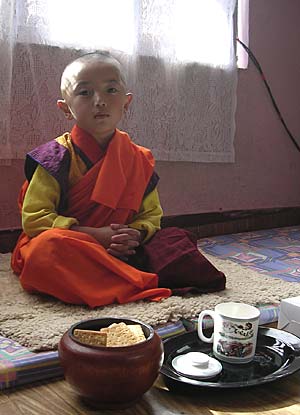
Rinchen Khandu’s five year old son is thought to be a reincarnated lama. When he’s not busy with his religious duties, he likes to watch cartoons on television. (Photo: Karen Michel)
|
[SOUND OF WRESTLING ON TELEVISION]
MICHEL: There was some unhappiness; professional wrestling was the culprit.
DORJI: [LAUGHS] And I had several complaints from the parents saying that the older brother is trying to imitate the actions that they saw on the wrestling to his younger brother and then he was having problems [LAUGHS]. And he told me to stop airing such kind of programs. But then, as a provider, I have to see the interest of all my clients.
[SOUND OF WRESTLING]
MICHEL: Clients who hardly ever see each other in person anymore.
DORJI: Before I used to know almost all of the people in Thimphu. Now, because of television and your own work, hardly we meet each other. On holidays we used to all, you know, go around meet and in the town we used to see each other, but it is now less frequent. Socializing is less frequent.
[LAUGHING, VOICES]
MICHEL: Pema Tsering’s wife, Tsering and her older sister Yangtse get together at his house, just about every afternoon. There are two TV’S in the home: one for the adults, the other for the kids.
TSERING: My younger one likes to watch cartoons, and then my second one likes to watch MTV, V channel and all music channels.
MICHEL: And what do you like to watch?
TSERING: I watch Bold & Beauty, I’m addicted to that serial [LAUGHS].
MICHEL: So is Tsering’s big sister, who sits in bed, watching TV.
YANGTSE: Basically, everyone is doing that. Oh, yeah, yeah, yeah, they are. Because we are just sitting around doing nothing. No exercise. sitting watching TV, eating. Front of the TV. As a family, like, we hardly talk to each other. No talking because we have no time, we are busy watching our TV.
TSERING: That’s really true that’s what my sister just said.
YANSTE: People don’t have time for their children. Half the time they don’t know where the kids are because they are glued to the TV.
[TV VOICE: …..ANOTHER HOUR AT NINE METERS….]
| |
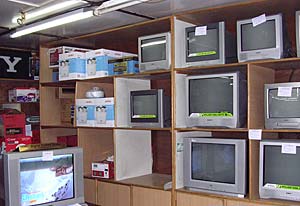
Televisions are now sold in Bhutan. (Photo: Karen Michel)
PEK-DORJI: The tendency for a lot of people is to think that ‘oh this must be really bad’.
MICHEL: Siok Sian Pek-Dorji was recently commissioned to assess the impact of media in Bhutan. The Ministry of Information and Communications wanted to know, ‘how can Bhutan’s media contribute to gross national happiness?’
PEK-DORJI: I found out most Bhutanese are very, very open to new influences. And they’re very confident that they’ll be able to pick the good from the bad. And that seems to be a very common, um, a shared feeling among many Bhutanese. And they’re confident that, oh our children will, you know, learn so much. They see the positive rather than the negative
MICHEL: English improves by watching TV, say the parents, who must weigh language skills with the product lust promoted by commercials. I met a 20 year old who was so taken by the first ad she ever saw on TV for face cream that now she wants to open Bhutan’s first advertising agency. Her younger brother, on the other hand was just taken with TV itself becoming, in his inertia, as obese as any fast-food chomping American adolescent. Pek’s study confirmed that parents were right that their children spent too much time in front of the tube and also right that there are beneficial aspects to exposure to the global village. The study also stresses the need to include images of the local villages, as well.
PEK-DORJI: I think the main issue in terms of the media today in Bhutan is content. How do we create enough content to balance the inflow of media, whether its images or just information?
ANNOUNCER: And with that we come to the end of the morning broadcast after BBS. Thank you for being with us. I’m ??? and I’ll be back in the afternoon at two p.m. with our afternoon English service. So join me then….
MINGBO: Hi, my name is Mingbo, I am managing director of Bhutan Broadcasting Services here in Thimpu.
[BBS ANNOUNCER fades under]
MINGBO: We have four hours of live broadcast and four hours of rebroadcast every morning that is television. And of course radio in four different languages, two regional languages, one national language, and one in English.
MICHEL: 15 hours a day, nearly a fourth of it the sound track taken from BBS TV. Though much of BBS TV isn’t visually sophisticated or stimulating--a man, or men, in somber go, sitting behind a table, being serious. The real drama is in the large number of public service announcements: many of them for aids, including one counseling that HIV isn’t transmitted from toilet seats. With a national literacy rate at just over 50 percent, BBS managing director Mingbo sees a need for the Bhutanese Broadcasting Service to provide both education and entertainment.
MINGBO: Entertainment programs, the songs and dances on the TV programs. I know we have so many channels. Some of the channels they can’t make heads or tails of it.
[BBS DOCUMENTARY: The solution is to provide boarding….]
MICHEL: The radio and TV staffs of BBS are the same; a convergence of necessity. And there aren’t enough resources, human or financial, to increase the amount…or the sophistication…of local programming. BBS’s star producer studied at UC Berkeley’s graduate school of journalism. Most Bhutanese men wear their hair short; Tsewang Dendup’s locks curl down his neck.
TSEWANG: The TV is definitely emerging as a medium. But, not surprisingly, because the art of visual storytelling has always been there. If you go to our temples, it’s replete with paintings, right? If you go to Bhutanese houses you see all this traditional paintings that depicts the life of the Buddha. So, I mean, how is television different?
[SOUNDS OF RELIGIOUS CEREMONY]
MICHEL: Bhutan has mobile phone service and an internet provider, too. And so, there are internet cafés--without café or, generally, internet connection. However many computers there are it seemed video gaming was more profitable in a country with at most ten percent computer literacy. Two percent may be closer to the truth. A low-cost desktop computer costs as much as a year’s average salary in Bhutan. Pema has a computer at home; his cousin, Deki was eager to learn how to use one.
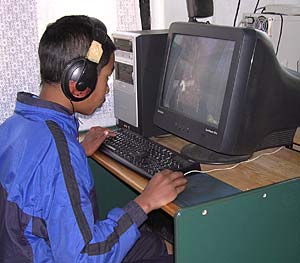
A Bhutanese boy plays video games at the local internet café. (Photo: Karen Michel)
|
DEKI: Um, the computer, I don’t know much but, for the television, I think if you watch this informative channels, I don’t think its, its going to lose our culture, because it gives us ideas, and it also makes us aware of all of the things which are happening in the outside world. But the internet I don’t know much about it.
MICHEL: Well, she’s learned. Recently, I got an email from Deki, in the form of a Mother’s Day card from an online service. So far as I know, there’s no greeting card industry…nor Mother’s Day in Bhutan. Now she’s learned that on the internet the store is always open. In a country where credit cards are even newer than television, can a local Bhutanese shopping channel be far behind? Who knows?--Maybe that’s another way to achieve gross national happiness. For Living on Earth, I’m Karen Michel in Bhutan.
[PUJA MUSIC PLAYS]
CURWOOD: Our story, “The Buddha is One and Zeroes” was produced as part of “Worlds of Difference,” a project of Homelands Productions and made possible in part with funds from the Corporation for Public Broadcasting. For more information, visit our website at living on earth dot org.
[BHUTANESE MUSIC PLAYS. PERSON CHANTS]
Living on Earth wants to hear from you!
Living on Earth
62 Calef Highway, Suite 212
Lee, NH 03861
Telephone: 617-287-4121
E-mail: comments@loe.org
Donate to Living on Earth!
Living on Earth is an independent media program and relies entirely on contributions from listeners and institutions supporting public service. Please donate now to preserve an independent environmental voice.
NewsletterLiving on Earth offers a weekly delivery of the show's rundown to your mailbox. Sign up for our newsletter today!
 Sailors For The Sea: Be the change you want to sea. Sailors For The Sea: Be the change you want to sea.
 The Grantham Foundation for the Protection of the Environment: Committed to protecting and improving the health of the global environment. The Grantham Foundation for the Protection of the Environment: Committed to protecting and improving the health of the global environment.
 Contribute to Living on Earth and receive, as our gift to you, an archival print of one of Mark Seth Lender's extraordinary wildlife photographs. Follow the link to see Mark's current collection of photographs. Contribute to Living on Earth and receive, as our gift to you, an archival print of one of Mark Seth Lender's extraordinary wildlife photographs. Follow the link to see Mark's current collection of photographs.
 Buy a signed copy of Mark Seth Lender's book Smeagull the Seagull & support Living on Earth Buy a signed copy of Mark Seth Lender's book Smeagull the Seagull & support Living on Earth
| | |












